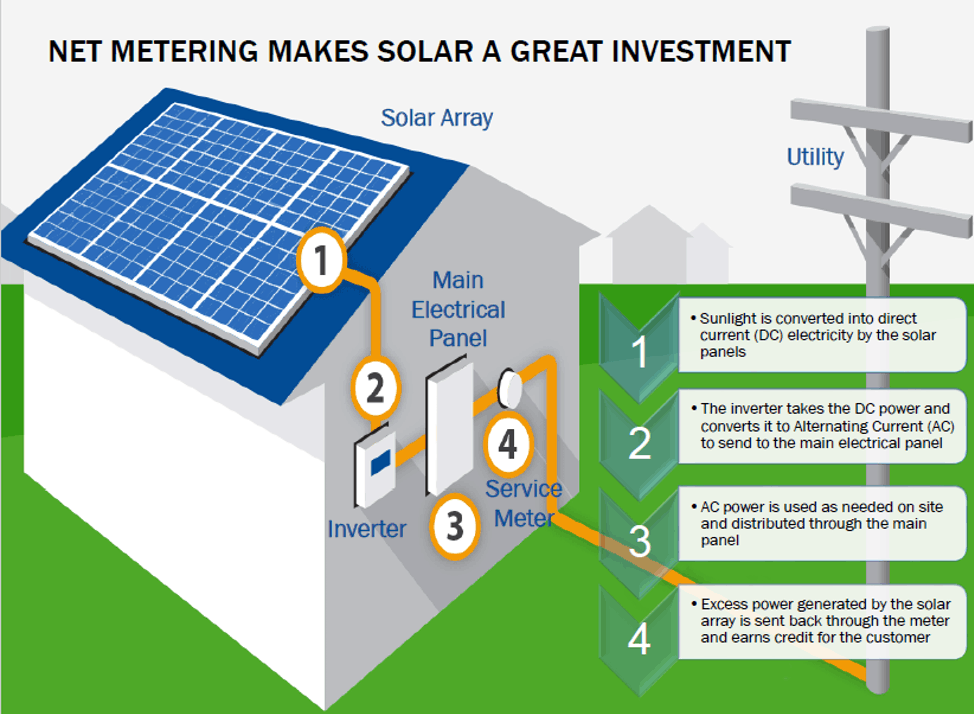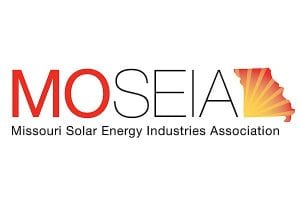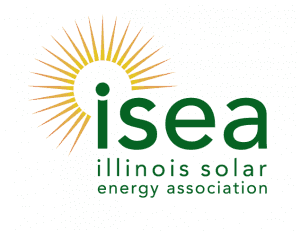Probably, most jurisdictions require us to obtain both electrical and building permits. However, there are a few that don’t. Even in this case, we still provide a full engineering and drawing package identical to the permitting package for your records. This is the benefit of working with a professional company like EFS Energy–we take care of it for you!
FREQUENTLY ASKED QUESTIONS
The moment that sunlight hits a solar panel, electricity is created and a direct current (DC) travels through the wires to an inverter. The inverter takes that direct current and generates alternating current (AC) for use in your home or business. When you generate more power than you are using, your meter actually runs backwards as excess energy flows back to the grid! With most electric utility companies, this will count as a credit to be used later when you consume more energy than your panels produce.
Our Solar Energy Consultants can quickly identify if your home or business or right for solar using advanced shade analysis tools such as Aurora. We can pull up your building to see what roof faces would be appropriate and any shading impact on the production. Then, using your consumption history can determine the right size system based on the space available. If it is a new building, a square foot calculation may be used to predict the amount of power needed.
There are Federal and Statewide incentive programs to help urge homeowners and business owners to install solar energy on their properties as well as implement suggested efficiency improvements from an energy audit.
There is a Federal Tax Credit for residential and commercial property owners that install solar pv systems that cover 30% of your total costs with no maximum credit. The taxpayer may claim this credit of qualified expenditures for a system that serves the taxpayer’s property.
Low-Income Communities – The ITC is eligible for an additional 10%-20% boost for projects in eligible low-income communities. The ITC’s may be transferred or sold to other taxpayers.
In the state of Missouri, any taxpayer who paid a certified entity to complete a home energy audit or other efficiency improvements may take a tax deduction of $1,000 maximum per year per individual and $2,000 maximum for joint filing. A home energy audit must be performed before the implementation of any energy efficiency upgrades to be eligible for this tax deduction. Also, homeowners in Missouri are also encouraged to add solar energy systems to their homes with a 100% solar property tax exemption. Markets across the U.S. have noted solar energy adds 50% of its retail value to the property’s value, and thanks to that exemption, you will not pay a thing in taxes on all that added value! In addition, different statewide programs and utility company rebates may be in place at the time you are looking to install so ask us today if you qualify for any other incentives!
In addition, different statewide programs and utility company rebates may be in place at the time you are looking to install so ask us today if you qualify for any other incentive!
The average residential system is around 6kW which takes up about 450 square feet of roof or ground space.
As a Trade Ally Partner of Ameren, we can review your previous electric usage with your account number and determine what size solar system would be right for you. If your utility provider is not Ameren, we are able to use a simple calculation to determine the appropriate system size if you provide us with either the amount of an average monthly electric bill you are currently paying or how much electrical usage (kWh) your property uses monthly.
A properly installed solar power system should require little to no maintenance and will include detailed monitoring to ensure the system is running optimally. However, any dust or debris that settles on the modules is usually removed by normal rainfall. Sometimes larger obstructions such as leaves or bird droppings can cause production losses, but this is typically minimal and would not require your intervention. A quality installation partner like EFS Energy will be there to monitor and troubleshoot any issues as well as work with manufacturers on anything that falls under their warranty scope.
Our recommended panels come with 25 year production warranties and inverters come with 12-25 year warranties so you can rest easy knowing you will be benefiting from reliable solar energy well into the future. Many early solar panels are still running efficiently after 30+ years. It is very likely that the lifespan of your panels will exceed their warranty.
Just like any other investment, solar is a long term investment that will pay for itself over time. However, with the current incentives: 30% Federal ITC, local rebates, depreciation, and monthly energy savings from the utility (many of which are when demand charges and peak-hours are high), the first 5 year savings average from 50-100%. Our detailed financial analysis will show you exactly what to expect.
The amount of power your solar system generates is directly proportional to the amount of sunlight available so it will produce less energy when the weather is cloudy and no energy at nighttime. However, our estimates are based on the National Renewable Energy Laboratory’s information and account for the climate based on the location of your property. Unless specified by the customer we design all of our systems to remain tied to the grid so our customers can take advantage of net metering. This way you can bank credits for the excess energy produced during the day to offset cloudy days and energy consumed at night.
If you have a grid-tied system, it will automatically shut down until the power is restored. This is for safety precautions and allows the utility company to safely make the necessary repairs. There are certain inverters and electrical configurations that would allow for backup power from a battery bank or generator in the case you would like power during an outage. If you experience multiple power outages or long durations without power it may be beneficial to look at backup solutions.
Typically the average weight addition to a structure is around 2.8psf (pounds per sq. ft.) with the solar module, racking, and wire management. Before any solar installation, a full inspection of the current roof structure and condition should be performed to ensure the additional weight load, wind load, and other factors will not harm the current structure. In addition, the areas where the solar array will be located will protect that section of the roof, extending its lifetime.
No, with a grid tied system think of your utility as being a giant battery. When you are overproducing, the energy will be sent to the utility, when you need it, they will send it back giving you credit for what you sent to them. This is called Net Metering.
Net metering is a law that allows for retail credit to be given to customers for power that is sent back to the grid. This ends up being beneficial to the utility company as it reduces the demand on the power lines at peak times of day when the sun is shining and air conditioners are running. However, the utility will typically limit the amount of power that can be sold back at retail rates to the amount that the customer has consumed during that billing cycle. Excess power generated after that point may be sold back for a credit but at a reduced price point. That means you will not want to generate more power than you will use in that cycle due to diminishing returns. Some utilities allow you to keep the retail credits for a full year, while others have a monthly reset.

- Lower operational cost of your home or business = Savings back in your pocket
- Tax Credits and Incentives to offset the initial cost
- Financing to see a positive cash flow sooner
- Increase in home value–homes with solar sell quicker and higher than those without solar
- Provides strength to the local economy
- Reduces air and water pollution
- Reduces Water Usage
- Reduces Dependence on Nonrenewable Energy Sources
- Improves Humanity’s Health
- Helps Fight Climate Change
We work with several solar specific lending partners that make financing easy. Take a look at our financing page for more details or reach out to one of our energy consultants to see what would be the best fit for you.
$0 down financing may be the most popular option and is available at a low interest rate that could provide the opportunity to pay down higher interest debt.
Standard string inverters are typically used in situations where shading is not an issue. With string inverters, the solar panels are all “strung” together and run DC power down to the inverter which will be hung on the wall in the basement or garage and is about the size of an electrical panel.
Microinverters and just that: small inverters that are installed on the solar modules themselves. Microinverters are used in areas where shading from trees or other buildings will cause partial shading of the solar array. Because each solar panel has its own inverter, the system is affected far less by shade than a string inverter.
Optimizers are like a hybrid between the other two technologies. Small optimizers will be installed on each module to mitigate shading just like microinverters, but there is also an inverter that hangs on the wall as well.
EFS carefully researches the best technology from each category and recommends the best fit for each situation.
EFS Energy prides itself on custom solutions for our customers. We spend the time upfront with you as the customer to determine the best solution for your energy needs. With that being said we try to keep this as smooth of a process as possible. On average from first contact your energy consultant can have a proposal ready for you to review in just a few days.
Once you decide to go solar, the entire process takes 2-4 months on average depending on a variety of factors such as incentive programs, permitting, and demand. It’s best to start the process early in the year to ensure maximum tax benefits.
Commercial and Agricultural
We pride ourselves in custom solutions for every client. The benefit of this is that we take into account your specific location, roof pitch, shading and orientation into each design. This means that while there are ranges our projects will typically fall within, it is hard to give any real estimate without a conversation about your property and what you are trying to accomplish with solar. This conversation could include storage and backup solutions, applicable product warranties and system performance that would factor into the project cost. To find out more about what an EFS Energy system will cost and the savings associated, get your FREE Solar Quote from one of our Energy Consultants.
RECs are tradable, non-tangible energy commodities that represent 1 megawatt-hour of electricity generated from an eligible renewable energy source. Select markets are participating at different levels so check in with us today about the options in your state.
Business Energy Investment Tax Credit (ITC)
Businesses that install solar photovoltaic (PV) systems are eligible to receive a tax credit in the amount of 30% for installations started in 2022 of the total PV system cost. The ITC is eligible for an additional 10%-20% boost for projects in eligible low-income communities. Unlike tax deductions, this tax credit can be used to directly offset your tax liability dollar for dollar. If your tax credit exceeds your tax liability you can roll the credit into future tax periods for 20 years. And now the ITC may be transferred or sold to other taxpayers.
Federal – 100% Bonus Depreciation (Tax Reform Bill)
100% of depreciation taken in first year through the end of 2022. Afterwards, 80% in year 1 and the next 20% is depreciated over the next 5 years. Basis for depreciation is the system price – 0.5*tax credit value. The value of the depreciation write-off is the basis * the tax rate.
Ameren Illinois Customer Generation Rebate – Rider CGR
The Ameren smart inverter rebate will be made available to business customers who have adopted solar utilizing SunSpec compliant inverter technology. Rebates will be provided once for each Eligible Facility, and calculated on a per watt basis of nameplate generating capacity measured in nominal DC power output at a rate of $250/kW. Upon approval of a rebate application, a Customer served by the Private Generation Facility shall no longer be entitled to receive any delivery service credits for the excess electricity generated by its facility. Annual net metering for supplier charges will remain active.
Solar Renewable Energy Credit Program (SRECs)
The Illinois Power Agency has developed electricity procurement plans to encourage homeowners and business owners across the state to install solar photovoltaic systems. Based on your system size, this program has the potential to credit an additional up to 35% of your total system costs.
Net Metering and Utility Company Rebates
In addition to net metering with your utility provider, certain utilities provide additional rebates for installing solar photovoltaic energy to your property.
Rural Energy for America Program (REAP) Grants
If you own a business in a rural area you may be in a REAP eligible area. REAP Grants award you up to 50% of your solar project. EFS works with a grant writer that has success in helping put our customers in a great position to be awarded one of these grants. Also, agricultural producers in any geography can apply in addition to rural businesses. Contact an Energy consultant today to find out how you can qualify!
Residential
We pride ourselves in custom solutions for every client. The benefit of this is that we take into account your specific location, roof pitch, shading and orientation into each design. This means that while there are ranges our projects will typically fall within, it is hard to give any real estimate without a conversation about your property and what you are trying to accomplish with solar. This conversation could include storage and backup solutions, applicable product warranties and system performance that would factor into the project cost. We offer many solutions for homeowners to aide you in this investment process from in-house financing options to other professionally recommended efficiency solutions to further lower your monthly bills and increase your overall efficiency. To find out more about what an EFS Energy system will cost and the savings associated, get your FREE Solar Quote from one of our Energy Consultants.
EFS Energy has experience with working with a variety of subdivisions, associations, and other groups and we are confident your system will be installed professionally and appropriately. It is important to let us know if there is an HOA that will need approval for installation so we can start any paperwork they require.
Please be sure to connect with us before your home goes on the market. We’ll help prepare your realtor to sell the value of solar, and once you have a buyer we will assist in the transfer of ownership process through the equipment’s manufacturer(s). According to the National Renewable Energy Laboratory (NREL), homes with solar panels sold 20% faster and for 17% more than homes without solar!
Residential Energy Investment Tax Credit (ITC)
There is a Federal Tax Credit for residential property owners that install solar PV systems that cover 30% of your total costs with no maximum credit. The taxpayer may claim this credit of qualified expenditures for a system that serves the taxpayer’s property.
In the state of Missouri, any taxpayer who paid a certified entity to complete a home energy audit or other efficiency improvements may take a tax deduction of $1,000 maximum per year per individual and $2,000 maximum for joint filing. A home energy audit must be performed before the implementation of any energy efficiency upgrades to be eligible for this tax deduction. Also, homeowners in Missouri are also encouraged to add solar energy systems to their homes with a 100% solar property tax exemption. Markets across the U.S. have noted solar energy adds 50% of the installed cost to the property’s value. Additionally, you will not pay a thing in taxes on all that added value! Plus, different statewide programs and utility company rebates may be in place at the time you are looking to install so ask us today if you qualify for any other incentives!
Solar Renewable Energy Credit Program (SRECs)
The Illinois Power Agency has developed electricity procurement plans to encourage homeowners and business owners across the state to install solar photovoltaic systems. Based on your system size, this program has the potential to credit an additional up to 35% of your total system costs.
Illinois Solar For All (ILSFA)
For income-qualified customers and communities, Illinois Solar For All provides increased incentives that allow customers to see savings immediately.
Net Metering and Utility Company Rebates
In addition to net metering with your utility provider, certain utilities provide additional rebates for installing solar photovoltaic energy to your property.
Government and Non-Profit
We pride ourselves in custom solutions for every client. The benefit of this is that we take into account your specific location, roof pitch, shading and orientation into each design. This means that while there are ranges our projects will typically fall within, it is hard to give any real estimate without a conversation about your property and what you are trying to accomplish with solar. This conversation could include storage and backup solutions, applicable product warranties and system performance that would factor into the project cost. To find out more about what an EFS Energy system will cost and the savings associated, get your FREE Solar Quote from one of our Energy Consultants.
RECs are tradable, non-tangible energy commodities that represent 1 megawatt-hour of electricity generated from an eligible renewable energy source. Select markets are participating at different levels so check in with us today about the options in your state.
Non-profits, Government buildings, and public schools are unable to take advantage of the Investment Tax Credit or MACRS Depreciation since they do not have an annual tax liability. The following rebates and incentives are available to those entities. EFS Energy also works with a financier that offers a discount to these entities to offset the lack of tax credits available. Contact a Solar Consultant today to find out how you can save on your project cost for your non-profit today!
Ameren Illinois Customer Generation Rebate – Rider CGR
The Ameren smart inverter rebate will be made available to business customers who have adopted solar utilizing SunSpec compliant inverter technology. Rebates will be provided once for each Eligible Facility, and calculated on a per watt basis of nameplate generating capacity measured in nominal DC power output at a rate of $250/kW. Upon approval of a rebate application, a Customer served by the Private Generation Facility shall no longer be entitled to receive any delivery service credits for the excess electricity generated by its facility. Annual net metering for supplier charges will remain active.
Solar Renewable Energy Credit Program (SRECs)
The Illinois Power Agency has developed electricity procurement plans to encourage homeowners and business owners across the state to install solar photovoltaic systems. Based on your system size, this program has the potential to credit an additional up to 35% of your total system costs.
Net Metering and Utility Company Rebates
In addition to net metering with your utility provider, certain utilities provide additional rebates for installing solar photovoltaic energy to your property.
Rural Energy for America Program (REAP) Grants
If you own a business in a rural area you may be in a REAP eligible area. REAP Grants award you up to 25% of your solar project. EFS works with a grant writer that has success in helping put our customers in a great position to be awarded one of these grants. Contact an Energy consultant today to find out how you can qualify!






